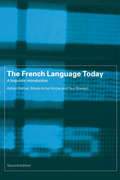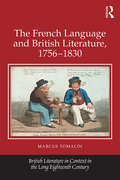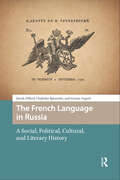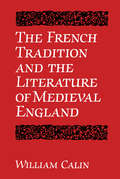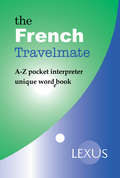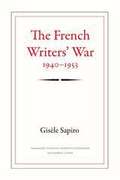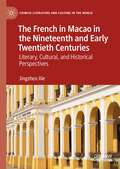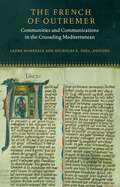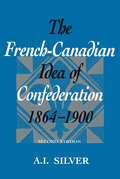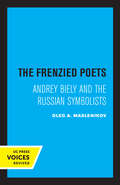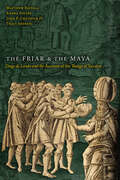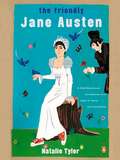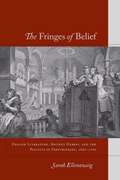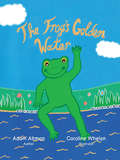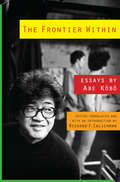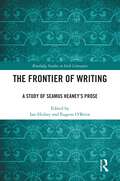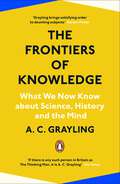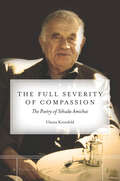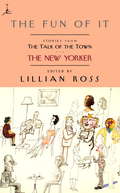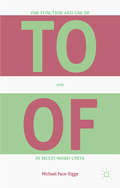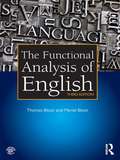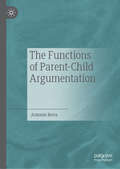- Table View
- List View
The French Language Today: A Linguistic Introduction
by Adrian Battye Marie-Anne Hintze Paul RowlettThis book provides a comprehensive introduction to the French language from the perspective of modern linguistics. Placing French within its social and historical context, the authors highlight the complex, diverse aspects of the language in a lively and accessible way. A variety of topics is covered, including the distribution of French in the world, the historical development of standard French, the sound system of French, its sentence patterns, and its stylistic and geographical variations.Fully updated and revised, this new edition places a greater emphasis on sociolinguistics. To make the book more user-friendly, the following new features have been added:* a further reading guide at the end of each chapter* a glossary of linguistic terms* an expanded bibliography and index.
The French Language and British Literature, 1756-1830 (British Literature in Context in the Long Eighteenth Century)
by Marcus TomalinFrom the 1750s to the 1830s, numerous British intellectuals, novelists, essayists, poets, playwrights, translators, educationalists, politicians, businessmen, travel writers, and philosophers brooded about the merits and demerits of the French language. The decades under consideration encompass a particularly tumultuous period in Anglo-French relations that witnessed the Seven Years' War (1756-1763), the American War of Independence (1775-1783), the Revolutionary and Napoleonic Wars (1792-1802 and 1803-1815, respectively), the Bourbon Restoration (1814-1830), and the July Revolution (1830) - not to mention the gradual expansion of the British Empire, and the complex cultural shifts that led from Neoclassicism to Romanticism. In this book, Marcus Tomalin reassesses the ways in which writers such as Tobias Smollett, Maria Edgeworth, William Wordsworth, John Keats, William Cobbett, and William Hazlitt acquired and deployed French. This intricate topic is examined from a range of critical perspectives, which draw upon recent research into European Romanticism, linguistic historiography, comparative literature, social and cultural history, education theory, and translation studies. This interdisciplinary approach helps to illuminate the deep ambivalences that characterised British appraisals of the French language in the literature of the Romantic period.
The French Language in Russia: A Social, Political, Cultural, and Literary History (Languages and Culture in History)
by Derek Offord Vladislav Rjéoutski Gesine ArgentWith support from the Arts and Humanities Research Council of the UK and the Deutsches Historisches Institut Moskau , The French Language in Russia provides the fullest examination and discussion to date of the adoption of the French language.
The French Tradition and the Literature of Medieval England
by William CalinThe French presence in English literary history in the centuries following the Conquest has to some extent been glossed over or treated as an interlude. During this period, roughly 1100 - 1420, French, like Latin, was the language of the educated; in the courts of England, and for nobles, clerics, and the rising commercial elements, communication was multilingual. In his ground-breaking study, William Calin explores indepth this era of medieval English literature and culture in relation to its distinctly French influences and contemporaries. He examines the Anglo-Norman contribution to medieval literature, concentrating on romance and hagiography; the great continental French texts, such as Prose Lancelot and the Romance of the Rose, which had a dominant role in shaping literature in English; and the English response to the French cultural world - the two 'modes' in English where the French presence was most significant: court poetry (Chaucer, Gower, Hoccleve) and Middle English romance. This book is grounded in French sources both well-known and relatively obscure. Translations of the Old French make The French Tradition and the Literature of Medieval England accessible to scholars and students of Medieval English, comparatists, and historians, as well as those proficient in French. Calin develops a synthesis of medieval French and English literature that will be especially useful for classroom study.
The French Travelmate
by Lexus Sandrine FrançoisThe French Travelmate phrasebook and dictionary gives you a detailed yet easy-to-use A to Z list of English words and phrases with French translations for quick-find reference. There are more than 3500 words and phrases, and the French translations come together with an easy-to-read pronunciation guide. Tap a hyperlink (there are hundreds of them) to go to special sections: travel tips about being in France; basic language notes; typical French replies to your French questions; conversion tables. These are features which make the Travelmate the must-have ebook French phrasebook download for the traveller who wants to really communicate. The French Travelmate phrasebook and dictionary also gives you a detailed French menu reader of over 500 items and a dictionary section with translations of over 300 common French signs and notices. This is the little book that's a big help. And a joined-up language experience.
The French Writers’ War, 1940–1953
by Vanessa Doriott Anderson Dorrit Cohn Gisèle SapiroThe French Writers' War, 1940-1953, is a remarkably thorough account of French writers and literary institutions from the beginning of the German Occupation through France's passage of amnesty laws in the early 1950s. To understand how the Occupation affected French literary production as a whole, Gisèle Sapiro uses Pierre Bourdieu's notion of the "literary field." Sapiro surveyed the career trajectories and literary and political positions of 185 writers. She found that writers' stances in relation to the Vichy regime are best explained in terms of institutional and structural factors, rather than ideology. Examining four major French literary institutions, from the conservative French Academy to the Comité national des écrivains, a group formed in 1941 to resist the Occupation, she chronicles the institutions' histories before turning to the ways that they influenced writers' political positions. Sapiro shows how significant institutions and individuals within France's literary field exacerbated their loss of independence or found ways of resisting during the war and Occupation, as well as how they were perceived after Liberation.
The French in Macao in the Nineteenth and Early Twentieth Centuries: Literary, Cultural, and Historical Perspectives (Chinese Literature and Culture in the World)
by Jingzhen XieThe French in Macao in the Nineteenth and Early Twentieth Centuries: Literary, Cultural, and Historical Perspectives investigates the role that Macao played as a meeting place of the East and the West during this period of time and its decline as a Portuguese colony in the eyes of the Europeans. The book provides a comprehensive view of representations of Macao as portrayed by the French. These texts in French have been studied less than Chinese or Portuguese texts on Macao. Overall, the book contributes to the study of colonial history, cultural studies, and China in the late Qing dynasty.
The French of Outremer: Communities and Communications in the Crusading Mediterranean (Fordham Series in Medieval Studies)
by Laura K. Morreale and Nicholas L. Paul, EditorsThe establishment of feudal principalities in the Levant in the wake of the First Crusade (1095-1099) saw the beginning of a centuries-long process of conquest and colonization of lands in the eastern Mediterranean by French-speaking Europeans. This book examines different aspects of the life and literary culture associated with this French-speaking society. It is the first study of the crusades to bring questions of language and culture so intimately into conversation. Taking an interdisciplinary approach to the study of the crusader settlements in the Levant, this book emphasizes hybridity and innovation, the movement of words and people across boundaries, seas and continents, and the negotiation of identity in a world tied partly to Europe but thoroughly embedded in the Mediterranean and Levantine context.
The French-Canadian Idea of Confederation, 1864-1900
by A. I. SilverAt Confederation, most French Canadians felt their homeland was Quebec; they supported the new arrangement because it separated Quebec from Ontario, creating an autonomous French-Canadian province loosely associated with the others. Unaware of other French-Canadian groups in British North America, Quebeckers were not concerned with minority rights, but only with the French character and autonomy of their own province.However, political and economic circumstances necessitated the granting of wide linguistic and educational rights to Quebec's Anglo-Protestant minority. Growing bitterness over the prominence of this minority in what was expected to be a French province was amplified by the discovery that French-Catholic minorities were losing their rights in other parts of Canada. Resentment at the fact that Quebec had to grant minority rights, while other provinces did not, intensified French-Quebec nationalism.At the same time, French Quebeckers felt sympathy for their co-religionists and co-nationalists in other provinces and tried to defend them against assimilating pressures. Fighting for the rights of Acadians, Franco-Ontarians, or western Métis eventually led Quebeckers to a new concern for the French fact in other provinces.Professor Silver concludes that by 1900 Quebeckers had become thoroughly committed to French-Canadian rights not just in Quebec but throughout Canada, and had become convinced that the very existence of Confederation was based on such rights.Originally published in 1982, this new edition includes a new preface and conclusion that reflect upon Quebec's continuing struggle to define its place within Canada and the world.
The Frenzied Poets: Andrey Biely and the Russian Symbolists
by Oleg A. MaslenikovThis title is part of UC Press's Voices Revived program, which commemorates University of California Press’s mission to seek out and cultivate the brightest minds and give them voice, reach, and impact. Drawing on a backlist dating to 1893, Voices Revived makes high-quality, peer-reviewed scholarship accessible once again using print-on-demand technology. This title was originally published in 1952.
The Freshwater Alphabet Book (Jerry Pallotta's Alphabet Books)
by Jerry PallottaCome take a swim with freshwater creatures from around the world! Meet a fish that has no eyes and one that has four of them. Get to know an eel that carries enough electricity to light up a light bulb and a glacier-dwelling worm with blood that works like antifreeze.Jerry Pallotta has done it again! The acclaimed alphabet-book author has joined forces with illustrator David Biedrzycki to create an exquisite and informative introduction to freshwater dwellers.
The Friar and the Maya: Diego de Landa and the Account of the Things of Yucatan
by Matthew Restall Traci Ardren John F. Chuchiak Amara SolariThe Friar and the Maya offers a full study and new translation of the Relación de las Cosas de Yucatán (Account of the Things of Yucatan) by a unique set of eminent scholars, created by them over more than a decade from the original manuscript held by the Real Academia de la Historia in Madrid. This critical and careful reading of the Account is long overdue in Maya studies and will forever change how this seminal text is understood and used. For generations, scholars used (and misused) the Account as the sole eyewitness insight into an ancient civilization. It is credited to the sixteenth-century Spanish Franciscan, monastic inquisitor, and bishop Diego de Landa, whose legacy is complex and contested. His extensive writings on Maya culture and history were lost in the seventeenth century, save for the fragment that is the Account, discovered in the nineteenth century, and accorded near-biblical status in the twentieth as the first “ethnography” of the Maya. However, the Account is not authored by Landa alone; it is a compilation of excerpts, many from writings by other Spaniards—a significant revelation made here for the first time. This new translation accurately reflects the style and vocabulary of the original manuscript. It is augmented by a monograph—comprising an introductory chapter, seven essays, and hundreds of notes—that describes, explains, and analyzes the life and times of Diego de Landa, the Account, and the role it has played in the development of modern Maya studies. The Friar and the Maya is an innovative presentation on an important and previously misunderstood primary source.
The Friendly Jane Austen
by Natalie TylerEvery generation rediscovers Jane Austen with a renewed enthusiasm for her timeless novels. in recent years, Austen has become more popular than ever as nearly every one of her books has been gorgeously filmed and reinterpreted to reflect today's sensibilities. Both diehard Austen addicts and new converts to the cult will find endless revelations and witty insights in The Friendly Jane Austen. With quizzes, eye-catching illustrations, interviews with Austen scholars and admirers, a filmography, bibliography, browsable quotes and sidebars, and engaging commentaries that illuminate her family life, early writings, and novels, The Friendly Jane Austen answers questions such as: * What are Jane Austen's ten surefire ways to be vulgar? * How do you tell a rake from a rattle? (Hint: They're both rascals. ) * Why is Jane Austen sometimes called the mother of the romance novel? * Who is Sense and Sensibility's only sexy man? * How much money did Jane Austen earn from her books during her lifetime?
The Fringes of Belief: English Literature, Ancient Heresy, and the Politics of Freethinking, 1660-1760
by Sarah EllenzweigThe Fringes of Belief is the first literary study of freethinking and religious skepticism in the English Enlightenment. Ellenzweig aims to redress this scholarly lacuna, arguing that a literature of English freethinking has been overlooked because it unexpectedly supported aspects of institutional religion. Analyzing works by John Wilmot, Earl of Rochester, Aphra Behn, Jonathan Swift, and Alexander Pope, she foregrounds a strand of the English freethinking tradition that was suspicious of revealed religion yet often strongly opposed to the open denigration of Anglican Christianity and its laws. By exposing the contradictory and volatile status of categories like belief and doubt this book participates in the larger argument in Enlightenment studies--as well as in current scholarship on the condition of modernity more generally---that religion is not so simply left behind in the shift from the pre-modern to the modern world.
The Frog Alphabet Book (Jerry Pallotta's Alphabet Books)
by Jerry PallottaA is for Amazon Horned Frog. B is for Blue-legged Strawberry Frog. C is for Crested Newt. What other amphibians can you think of? Learn more about these sometimes cute, sometimes dangerous, but always fascinating animals in THE FROG ALPHABET BOOK. Jerry Pallotta and Ralph Masiello explore the ponds, look under rocks, and dig in the mud to bring you this colorful and fun way to learn more than the alphabet.
The Frog’s Golden Water
by Adam Altman Caroline WhelanSkippy has enjoyed swimming in the pond's golden water his entire life. But now the golden sparkle has disappeared, so Skippy and his friends must find out what happened and return to pond to its former splendor. Come join Skippy on his adventure of discovery in his charming story.
The Frontier Within: Essays by Abe Kobo (Weatherhead Books on Asia)
by Kōbō AbeAbe Kobo (1924–1993) was one of Japan's greatest postwar writers, widely recognized for his imaginative science fiction and plays of the absurd. However, he also wrote theoretical criticism for which he is lesser known, merging literary, historical, and philosophical perspectives into keen reflections on the nature of creativity, the evolution of the human species, and an impressive range of other subjects. Abe Kobo tackled contemporary social issues and literary theory with the depth and facility of a visionary thinker. Featuring twelve essays from his prolific career—including "Poetry and Poets (Consciousness and the Unconscious)," written in 1944, and "The Frontier Within, Part II," written in 1969—this anthology introduces English-speaking readers to Abe Kobo as critic and intellectual for the first time. Demonstrating the importance of his theoretical work to a broader understanding of his fiction—and a richer portrait of Japan's postwar imagination—Richard F. Calichman provides an incisive introduction to Abe Kobo's achievements and situates his essays historically and intellectually.
The Frontier of Writing: A Study of Seamus Heaney’s Prose (Routledge Studies in Irish Literature)
by Eugene O’Brien Ian HickeyThe Frontier of Writing: A Study of Seamus Heaney’s Prose is the first collection of essays solely focused on examining the Nobel prize winning poet’s prose. The collection offers ten different perspectives on this body of work which vary from sustained thematic analyses on poetic form, the construction of identity, and poetry as redress, to a series of close readings of prose writing on poetic exemplars such as Robert Lowell, Patrick Kavanagh, W.B Yeats, Ted Hughes, Philip Larkin and Brian Friel. Seamus Heaney’s prose is extensive in its literary depth, knowledge, critical awareness and its span. During the course of his life, he published six collections of prose entitled Preoccupations: Selected Prose 1968–1978, Place and Displacement: Recent Poetry of Northern Ireland, The Government of the Tongue: The 1986 T.S. Eliot Memorial Lectures and Other Critical Writings, The Place of Writing, The Redress of Poetry: Oxford Lectures and Finders Keepers. Each of these texts is addressed in the collection alongside occasional and specific essays such as ‘Crediting Poetry’, ‘Writer and Righter’ and ‘Mossbawn via Mantua: Ireland in/and Europe, Cross-currents and Exchanges’, among many others. This book is a comprehensive and timely study of Seamus Heaney’s prose from leading international scholars in the field.
The Frontiers of Knowledge: What We Know About Science, History and The Mind
by A. C. Grayling'Grayling brings satisfying order to daunting subjects' Steven Pinker_________________________In very recent times humanity has learnt a vast amount about the universe, the past, and itself. But through our remarkable successes in acquiring knowledge we have learned how much we have yet to learn: the science we have, for example, addresses just 5 per cent of the universe; pre-history is still being revealed, with thousands of historical sites yet to be explored; and the new neurosciences of mind and brain are just beginning. What do we know, and how do we know it? What do we now know that we don't know? And what have we learnt about the obstacles to knowing more? In a time of deepening battles over what knowledge and truth mean, these questions matter more than ever. Bestselling polymath and philosopher A. C. Grayling seeks to answer them in three crucial areas at the frontiers of knowledge: science, history and psychology. A remarkable history of science, life on earth, and the human mind itself, this is a compelling and fascinating tour de force, written with verve, clarity and remarkable breadth of knowledge._________________________'Remarkable, readable and authoritative. How he has mastered so much, so thoroughly, is nothing short of amazing' Lawrence M. Krauss, author of A Universe from Nothing'This book hums with the excitement of the great human project of discovery' Adam Zeman, author of Aphantasia
The Full Severity of Compassion
by Chana KronfeldYehuda Amichai (1924-2000) was the foremost Israeli poet of the twentieth century and an internationally influential literary figure whose poetry has been translated into some 40 languages. Hitherto, no comprehensive literary study of Amichai's poetry has appeared in English. This long-awaited book seeks to fill the gap. Widely considered one of the greatest poets of our time and the most important Jewish poet since Paul Celan, Amichai is beloved by readers the world over. Beneath the carefully crafted and accessible surface of Amichai's poetry lies a profound, complex, and often revolutionary poetic vision that deliberately disrupts traditional literary boundaries and distinctions. Chana Kronfeld focuses on the stylistic implications of Amichai's poetic philosophy and on what she describes as his "acerbic critique of ideology." She rescues Amichai's poetry from complacent appropriations, showing in the process how his work obliges us to rethink major issues in literary studies, including metaphor, intertextuality, translation, and the politics of poetic form. In spotlighting his deeply egalitarian outlook, this book makes the experimental, iconoclastic Amichai newly compelling.
The Fun of It: Stories from The Talk of the Town
by Lillian Ross David RemnickWilliam Shawn once called The Talk of the Town the soul of the magazine. The section began in the first issue, in 1925. But it wasn't until a couple of years later, when E. B. White and James Thurber arrived, that the Talk of the Town story became what it is today: a precise piece of journalism that always gets the story and has a little fun along the way. The Fun of It is the first anthology of Talk pieces that spans the magazine's life. Edited by Lillian Ross, the longtime Talk reporter and New Yorker staff writer, the book brings together pieces by the section's most original writers. Only in a collection of Talk stories will you find E. B. White visiting a potter's field; James Thurber following Gertrude Stein at Brentano's; Geoffrey Hellman with Cole Porter at the Waldorf Towers; A. J. Liebling on a book tour with Albert Camus; Maeve Brennan ventriloquizing the long-winded lady; John Updike navigating the passageways of midtown; Calvin Trillin marching on Washington in 1963; Jacqueline Onassis chatting with Cornell Capa; Ian Frazier at the Monster Truck and Mud Bog Fall Nationals; John McPhee in virgin forest; Mark Singer with sixth-graders adopting Hudson River striped bass; Adam Gopnik in Flatbush visiting the grandest theatre devoted exclusively to the movies; Hendrik Hertzberg pinning down a Sulzberger on how the Times got colorized; George Plimpton on the tennis court with Boris Yeltsin; and Lillian Ross reporting good little stories for more than forty-five years. They and dozens of other Talk contributors provide an entertaining tour of the most famous section of the most famous magazine in the world.
The Function and Use of TO and OF in Multi-Word Units
by Michael Pace-SiggeThe highly frequent word items TO and OF are often conceived merely as prepositions, carrying little meaning in themselves. This book disputes that notion by analysing the usage patterns found for OF and TO in different sets of text corpora.
The Functional Analysis of English: A Hallidayan Approach (An\arnold Publication Ser.)
by Thomas Bloor Meriel BloorThe Functional Analysis of English is an introduction to the analysis and description of English, based on the principles of systemic functional linguistics. It sets out the tools and analytic techniques of Hallidayan grammar with clear explanations of terminology and illustrates these with examples from a variety of texts, including science, travel, history and literary sources. This revised third edition incorporates references to recent research, better explanations of complex problems, and additional exercises. Key features: an updated overview of applications to real world issues revised sections on the current historical position of systemic functional grammar simple introductions to agnation, grammatical metaphor, and information structure chapter summaries, suggestions for further reading, exercises with answers and a glossary of terms a companion website with additional activities, exercises and supplementary readings for students and instructors This third edition is an indispensable introduction to systemic functional linguistics, which can be used independently or in preparation for M.A.K. Halliday and C.M.I.M. Matthiessen's Introduction to Functional Grammar. The book is an ideal text for students of linguistics, applied linguistics and grammar- those new to the field, or who have a background in traditional grammar, as well as teachers of English language.
The Functions of Parent-Child Argumentation
by Antonio BovaThis book provides a detailed examination of argumentative interactions in families with young children during mealtimes. It explores both the restrictions and the opportunities family mealtimes present and the types of issues addressed through argumentative discussions. Antonio Bova puts forward an in depth analysis of how both parents and children contribute to the inception and development of an argumentative discussion, and the categories of argument adopted most often by the two groups. Drawing upon a wealth of qualitative data from the recorded mealtime conversations of Italian and Swiss-Italian middle-class families, the author examines the crucial importance of argumentative interactions between parents and children during mealtimes. This book builds on recent advances in the study of the psychology of social interaction and sheds new light on the importance of argumentation at all stages of life.
